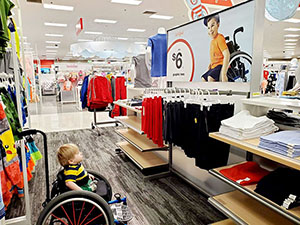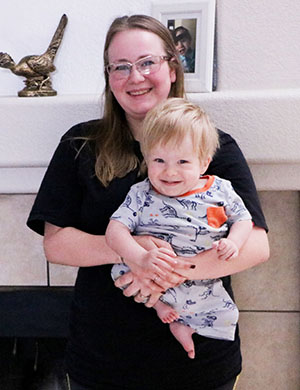Hey, You Look Just Like Me!
A Toddler’s Story of Inclusion
Wanting to fit in is a part of human nature. A sense of belonging and knowing there are others who share the same or similar experiences. Feeling included. That’s what Oliver Pena, a member of the DES Division of Developmental Disabilities (DDD) and the Arizona Early Intervention Program (AzEIP) and his family experienced earlier this year. During a routine shopping trip with his mother at a West Valley Target store, Oliver stopped in his tracks and stared, smiling at a poster.

Although only two-years old in March, Oliver has amazing upper body strength. “He’s really strong,” said his mother, Demi Porter. “He stopped his wheelchair…and I couldn’t push him.” It was a poster in the boys clothing department that made Oliver stop and stare. “He’s seen wheelchairs [before] but he’s never seen another child in a wheelchair. I think [he thought], ‘There’s a kid in a wheelchair like me!’”
Target and a handful of other retailers are depicting the full spectrum of their shoppers in their advertising. It’s an element of being inclusive.
“I didn’t think about this before, until I realized that it [inclusiveness] made a difference to him,” said Demi. “A lot of places right now are starting to be inclusive with their adaptive clothing, adaptive shoes, adaptive line of just about anything, which is spectacular! Before all of this, we had felt quite a bit of segregation at kid places [such as playgrounds]. So, we realize the importance of inclusive play. And how kids need to be taught, and parents as well. I think the world just needs to see this culture normalized.”

Oliver was born with an extremely rare disorder called Caudal Regression Syndrome. Only about 1,500 people worldwide have been documented with CRS, which affects the development of the spine, lower extremities and organs. Fortunately, Demi was able to identify and join an online Facebook group called the International Sacral Agenesis Caudal Regression Association (iSACRA).
“They have taught us tremendous amounts. They give us an idea of what to expect, which is huge for us,” said Demi. “These families are from across the world. We’re lucky enough to have one family here in Arizona.” There is a little girl about a year younger than Oliver who lives only three miles down the road. “We meet up every once in a while. As the kids get older, they’re going to play.”
Despite everything the doctors told the family to expect, Demi firmly believes there is no limit to Oliver’s future. “Every time I see an occupation that looks kind of hard, I do a little research. How can he do this because he’s in a wheelchair?” She discovered there are surgeons, pilots, and lawyers in wheelchairs. “He can do whatever he wants.”
Even at such a young age, Oliver really knows how to maneuver his wheelchair, and has an infectious smile and disposition. “That positive light that shines from him is what keeps everyone going. His positivity. I’ve never seen anybody so happy. You would think he has limitations, but he finds a way to get past every single one of them.”
By Lyn Riley

